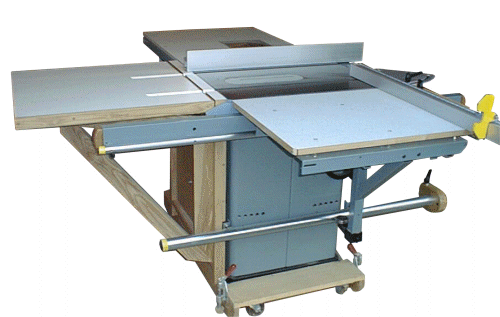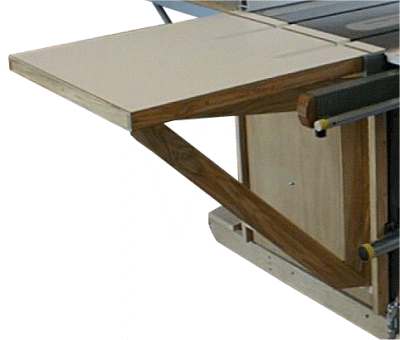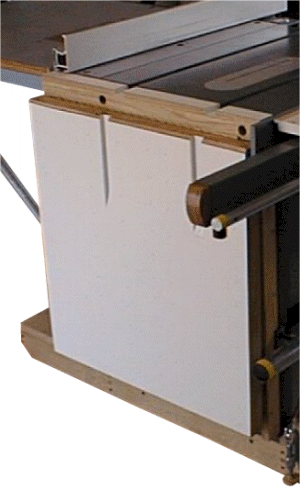|
|
|
Unisaw Outfeed Table
| The following is a description of a folding outfeed table designed for a cabinet saw. This particular unit was designed with a sliding table in mind but there is no reason why the table could not be widened to the left to line up with the left saw extension on a saw that was not equipped wit a sliding table. |
 |
This view shows the outfeed table in use with the rest of the saw system. The reason I describe it as a system is that all the modifications readily apparent in this view interact and must work well together. In this design, there is no provision for the factory blade guard system. |
| The outfeed table shown folded up in
this view is attached to the saw cabinet with four bolts and to the iron table with two
bolts. The unit consists of three components, the table, the "head", and
the support arm. The table is attached to the head via a piano hinge. The support arm is also attached to the head via a piano hinge. This hinge type was chosen since it has less slop compared to similar leaf hinges and since they are longer, they are also stronger. Although the table looks "light-duty", it will can support full sheets of Melamine without any signs of excess bending. |
 |
 |
In this image, the table is folded down; in this
configuration, it is less than four inches thick. The support arm folds into the
space occupied by the head and the table rests flush with the head. The table itself is a hollow core construction, it is made of hardwood strips with a laminate covered tempered hardboard top and a 1/4" plywood bottom surface; this makes the table very light. Not visible in this image is a series of pin holes in the top surface. By using an air fitting not visible on the edge, the surface can be turned into a floatation table when hooked up to an air supply. The two round circles visible in the head are the bolt locations use to secure the unit to the iron table. |
| This view taken from underneath the
table shows the support arm along with the four bolts used to attach the unit to the saw
cabinet. The support arm is a simple lap jointed structure. There is a
carriage bolt threaded into the end of the support arm; this bolt is used to set the table
level with the iron table or biased as desired. The bolt head fits into a socket
attached to the bottom of the table. Once the four cabinet bolt holes are located and drilled, the bolts are installed with the heads inside the cabinet and secured with washers and nuts. In order to install the head perpendicular with the iron table, a system of jam nuts and washers are used line the surfaces up, nuts and washers are used to fasten the head to the cabinet. From this perspective, these fasteners are really "studs". |
|